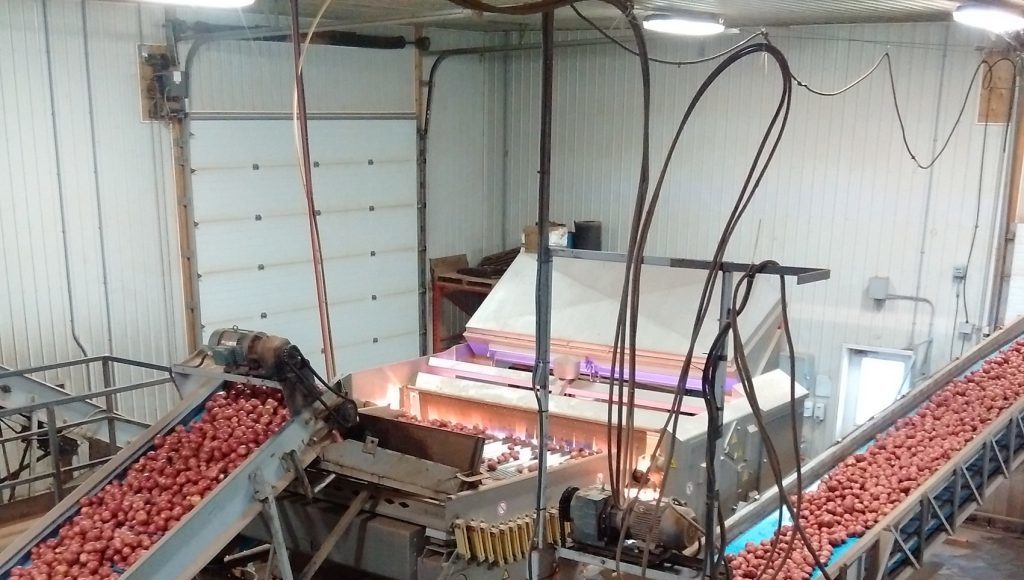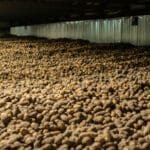[deck]PEI Potato Solutions provides farmers with technology to achieve higher grades, and expansion is coming.[/deck]
It’s been five years since Austin Roberts and his wife Ramona joined forces with other P.E.I. potato farmers to successfully improve their industry for the better.
In 2013, Austin (Kinkora Holdings) partnered with Marvyn Webster (Valley Grove Enterprises) and Andrew Lawless (Hilltop Produce) to built a pre-processing potato wash facility.
“We felt that P.E.I. farmers as a group needed a safe and environmental option to clean and optimize product in a high-capacity fashion,” Roberts explains. “We as a group were all willing to take on the significant financial risks involved.”
The required equipment was installed at a newly-constructed 14,000 square foot building in Travellers Rest, P.E.I. by January 2014, and PEI Potato Solutions (PPS, owned by RWL Holdings) was born. PPS was used by 12 farmers in its first year of operation to wash and sort close to 400 million pounds of potatoes a year. Previously, farmers would have to wash and pick through their harvest by hand.
That year, and also in 2015, there were some shocking incidents in the province involving deliberate placement of nails and pins in potatoes. This prompted PPS to purchase two custom-made metal detectors from a German company and add this service to their process.
“The model we chose had an excellent track record and was able to handle the high volumes,” says Roberts. “It has proven highly effective.”
In 2017, PPS decided to go further, purchasing an Insort Sherlock Separator-2400 chemical imaging machine from Austria for $1.1 million. This technology would allow the easy removal of debris as well as damaged potatoes, the first time such benefits were provided to potato farmers in North America. Before the purchase decision, Roberts and Webster visited several machine manufacturers and processors in Europe to compare different machines, and Roberts says the Insort was the right choice because it’s the only one that allows screening of potatoes with the peel intact.

(Photo courtesy PPS)
The technology works by first detecting foreign materials and potato defects, then diverting anything unsuitable to a reject bin or alternate conveyor. A worker examines the discarded material to recapture any tubers that happen to get mixed in and to assess defective potatoes for possible use. One foreign object that’s often found in the debris is golf balls.
“Most of them are collected and kept on site, with some of them displayed artfully to showcase our capabilities,” says Roberts. “Our plant manager is an avid golfer, so the best balls do see the greens again and live another day.”
PPS received financing assistance for the Insort with a loan of $375,000 from the Atlantic Canada Opportunities Agency and a $30,000 grant from the provincial government (under its Innovative Technologies Program). The company borrowed the rest of the $1.1 million and Roberts says it will be paid off in 10 years. PPS now employs 35 people.
Beginning and Ongoing Challenges
As PPS was the first facility of its kind in North America, Roberts and his team had to create their own construction plans.
“Water usage, waste water treatment and creating water reclamation systems were challenges,” says Roberts. “As farmers, we continually strive to be good stewards of the land and operate as environmentally-friendly as possible. We were very pleased to have the assistance of University of P.E.I. students to help us with water treatment and conservation.”
There are also ongoing challenges. Although each day starts with a plan, Roberts says the plan can and does change many times through the day, depending on different factors such as emergency needs of farmers and processors.
“We must always be ready to adapt everything, from the length of workday to screening parameters and load numbers,” he says. “This creates challenges in staffing, equipment utilization, and repair and maintenance scheduling. And staffing itself is an ongoing challenge at many agricultural facilities, including ours. As we’ve matured as a company and mechanize to a higher level, staffing has stabilized; but finding staff with the required interest and experience in agriculture still presents challenges.”
The PPS customer base has grown to about 15 clients who get their entire crop pre-processed by the firm, but Roberts adds, “There is likely not a processing producer on P.E.I. that we have not assisted at one time or another. We take great pride in being able to provide both everyday crop enhancement as well as emergency services.”
RWL will pick up potatoes at a farmer’s warehouse and bring them to the PPS facility for defect testing, washing and sorting, before taking them to the processer. “We will also process potatoes that are wet and have a high concentration of rot and damage which would otherwise be culled for cattle feed or burial,” says Roberts.
“In addition, we have a CFIA (Canadian Food Inspection Agency) Compliance Agreement which allows us to accept potatoes from indexed fields on P.E.I. and pre-screen potatoes from those fields before processing. These potatoes are only allowed, by direction of the CFIA and USDA, to be sold for processing and must be handled with the strictest regulation and documentation.”
New Capabilities to Come
Within the next two years, PPS is planning to double its capacity with a second building and processing line, which will require additional metal detectors and another imaging machine.
“This will extend our reach to assist the table and specialty markets as a service provider to the fresh pack industry,” says Roberts. “We are very excited, as the expansion will involve the acquisition of new ‘super sorting’ technology to allow each tuber to be streamed to its highest value market, allowing all producers to maximize their crop potential.
“We want to enable farmers to grow their return not by growing more product but by maximizing what they have through better utilization,” he adds. “We want to be able to provide processors with the potatoes that will suit their exact needs of the moment and maximize their first-time saleable grade, overall production and recovery. This is good for farmers, processors and the environment.”
Roberts speaks for his whole team in saying it has been an adventure over the last four years to go from concept to production, always trying to improve and respond to changing constraints in the industry.
“What we’ve enjoyed most is seeing the real and tangible differences we are making in the industry and the growers we have helped,” he says. “We’ve had farmers come to us at the end of a long washing day, shake our hands and say thank you for helping to save their farm. This was the kind of help we hoped to be able to provide at the outset and it’s a great reason to get up every morning. We hope to continue to serve potato farmers for a very long time.”











